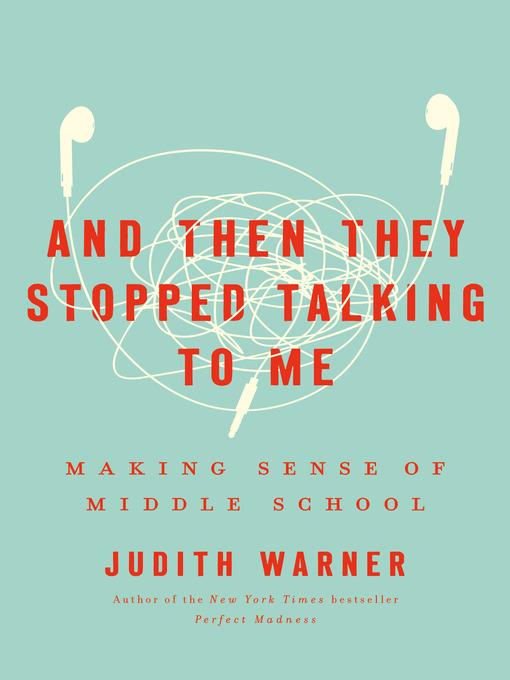
And Then They Stopped Talking to Me
Making Sense of Middle School
کتاب های مرتبط
- اطلاعات
- نقد و بررسی
- دیدگاه کاربران
نقد و بررسی

December 1, 2019
Author of the New York Times best-selling Perfect Madness: Motherhood in the Age of Anxiety, Warner calls on social scientists, psychologists, and educators (not to mention anxious mothers and fathers with stories to tell) as she argues that today's child-obsessed parents make the self-consciousness and hierarchy pressures of middle school even worse.
Copyright 2019 Library Journal, LLC Used with permission.

February 15, 2020
In this call for change, a bestselling author examines the often painful middle school years and offers parents sound advice that will enable their children to become more empathetic, caring, and resilient. This book stems from Warner's unrelenting desire to find good explanations for what her middle school-age daughter was experiencing, why the parents and other children were behaving as they were, and what she could do to improve the situation. Over the course of two years, the author interviewed more than 100 people, including experts, educators, parents, and nonparents, from a wide variety of backgrounds and ages. With few exceptions, what she found was a shared sense of social struggle. In order to provide a better understanding of the middle school years, Warner begins by exploring the societal history of the 11- to 14-year-old age group from Colonial America to the present. She points out that the view of this age group has shifted over time and that mass media has contributed to many of the myths and negatives stereotypes often associated with middle schoolers. Warner also cites research indicating that our own memories of middle school may be inaccurate or incomplete. According to scientists, there is a "second critical period" of brain development during adolescence. For this reason, we were incapable of seeing the big picture without the help of adults--and our children are facing the same thing. The author stresses that parents should view middle schoolers as "works in progress" and help them develop the tools they need to thrive by teaching and modeling the ability to think and feel beyond themselves. Warner argues that the great danger facing middle schoolers today is the values (or lack thereof) that we are teaching them. "Selfishness, competition, and personal success at any cost" must be replaced with new norms. "By rethinking the middle school years," she writes, "we have the opportunity to become better and happier adults." Certain relief, for middle schoolers and their parents, from the discomfort associated with a difficult period in life.
COPYRIGHT(2020) Kirkus Reviews, ALL RIGHTS RESERVED.

April 1, 2020
Considering the painful memories and lingering PTSD cited by some of the 125 individuals interviewed for this book, it's a wonder anyone has ever survived middle school. How have we come to this? Warner (Perfect Madness, 2005) offers several explanations. Precocious physical and social maturation, adolescents staying in school longer (instead of going to work or away to boarding school), and psychological pressure to be popular have all taken their toll. Warner's subjects' memories of bad behavior include bullying, shunning, shaming, and physical assault by former best friends, mean girls, cool kids, and sometimes even parent-to-parent. As Warner digs deeper, it becomes apparent that these hurtful episodes and feelings of exclusion are probably universal, and represent understandable reactions to seesawing emotions and hormonal swings. Her advice? Parents must keep channels of communication open, and model socially acceptable behavior, even in the face of wildly unpredictable and immature actions (whether from their own kids or other adults). This readable, relatable, and well-documented account makes sense, and should help families survive the middle school years.(Reprinted with permission of Booklist, copyright 2020, American Library Association.)

























دیدگاه کاربران